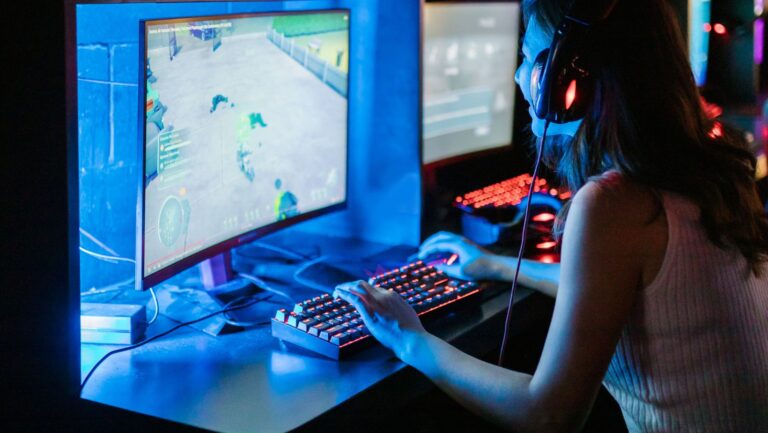The video gaming world is evolving, and we are seeing a lot of promises out there that might reshape the entire gaming industry. We are talking about the ownership of digital items, the ability to make money while playing games, as well as selling, trading, and staking your gear or in-game items.
Yes, this is real. Although blockchain technology has been around us for quite some time, and we still haven’t seen a big game developer make a Triple-A game infused with crypto, this doesn’t mean that it is not happening.
Remember, we are talking about a revolutionary technology that can redefine how we interact with video games, which sort of explains why big game developers are careful with adoption.
But one thing is for sure: blockchain technology is here to stay, and it will find one way or another to enter the video game market. But what about the in-game economies? How will crypto impact them?
What’s an In-Game Economy, Anyway?
Well, if you are a video game addict, you know the drill. You play the game and earn some currency like Gold in World of Warcraft, Apex Coins in Apex Legends, or cash in GTA Online. Then you can spend that money on weapons, skins, mounts, rides, new characters, and whatnot.
Now, let’s imagine that we put cryptocurrencies like Bitcoin or Ethereum instead of useless in-game money. Then, the entire thing changes.
We already have crypto games and sports betting using cryptocurrencies, which shows that the process is quite real, but they don’t have their own economies, and with video games, it is completely different. Click here to learn more about crypto casino betting.
To be honest, most games that were built using blockchain technology, like Axie Infinity, have their own token that goes up and down in value based on supply/demand.

Now, Axie Infinity is a niche game, but how about a big game like GTA 6? Let’s say that the long-awaited Grand Theft Auto VI comes with its own crypto token. In that case, just like the servers in GTA 5 Online, people can have working jobs where they appear every day and earn money in the game, which can be converted to real-world money. Players would likely use tools like Paybis bitcoin calculator to determine the real-world value of their in-game earnings before making conversion decisions.
Sounds crazy!
With traditional games, game developers control the currency, which is only a digital code. This means that it is locked to their world, but crypto flips that.
The Rise of Crypto in Gaming
Crypto isn’t new to gaming, although it is far from mainstream. We’ve seen many crypto play-to-earn games in the past, and most of them are not as popular as mainstream games like League of Legends or Palworld.
But this doesn’t mean that the blockchain market is a slouch. In fact, we are talking about an industry that hit $4.6 billion in 2022, and it is expected to grow at a 70% rate per year, reaching close to $70 billion by 2027.
The process will be accelerated even further if we see big games like GTA 6 adopt blockchain technology, and some rumors already suggest that they are working on some kind of token system that will redefine GTA’s economy.
This means that the potential is huge, and we are still scratching the surface of what this technology is capable of bringing into the gaming world.
Why Crypto Could Work
Let’s say that you snag a rare Call of Duty skin, but instead of it just sitting in your inventory, it’s an NFT—yours to keep, trade, or sell on a marketplace. Crypto lets you own stuff for real, not just borrow it from Activision.
Then there’s trading. In Diablo IV, gold’s stuck in-game; with crypto, you could swap it peer-to-peer, no middleman. Platforms like The Sandbox already let players buy virtual land with ETH—some plots sold for $4.3 million in 2021.
Big studios like EA or Ubisoft could jump in, letting you trade FIFA Ultimate Team cards or Assassin’s gear for crypto. I’d totally bid on a Messi card!
Plus, it’s global. Crypto skips currency headaches—your $10 in the U.S. matches someone’s 10 bucks in Japan, no conversion nonsense. That’s a clutch for games with millions of players worldwide.
What It Could Look Like
It will be like nothing we’ve seen before. Basically, video games will have their own economies like countries in the real world.

Let’s take Destiny 2 with a crypto twist: you earn a legendary sparrow, mint it as an NFT, and sell it for 0.01 ETH.
Or Minecraft servers where you trade diamond tools for Bitcoin, all tracked on-chain. Some games, like Decentraland, already run whole economies on crypto players spent $57 million on virtual goods there in 2024.
Big devs could go nuts—imagine Genshin Impact letting you stake tokens to unlock rare characters or Overwatch skins crossing into other Blizzard titles via blockchain. It’s not just loot; it’s an investment. I’d grind harder if my hours could cash out!
Is There a Catch?
Okay, not so fast—crypto’s got hiccups. First, the vibe. Gamers flipped when Ubisoft Quartz tried NFTs in 2021—tons hated it, calling it a cash grab. A 2024 poll showed that 68% of players still dislike NFTs in games. If devs push too hard, they risk a riot.
Then there’s the tech. Blockchain’s slow—Ethereum handles 15 transactions per second, while Visa does 1,700. A Fortnite match with 100 players trading live? It could lag like a dial-up modem. And energy use—Bitcoin’s network eats 91 terawatt-hours a year. Greener chains exist, but it’s still a PR headache.
Oh, and scams. Crypto gaming’s had flops—Evolved Apes devs ran off with $2.7 million in 2021. Big companies like Sony or Microsoft could dodge that with trust, but indie games? Risky.
So, it is a wild, wild industry, and most definitely the future of video games. Blockchain technology seems like it was built only for video games, and it is only a matter of time before we see game developers diving deeper into this new world.




